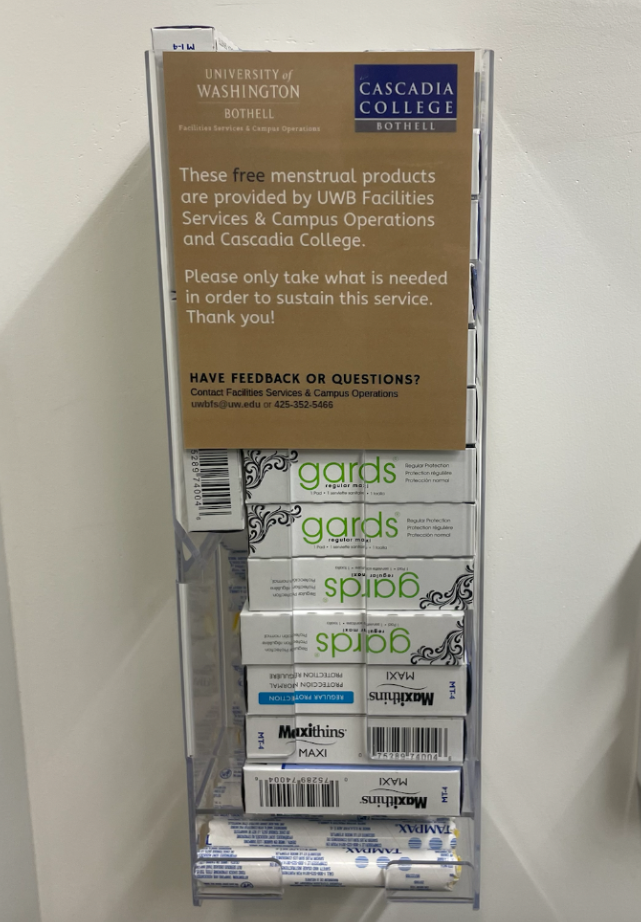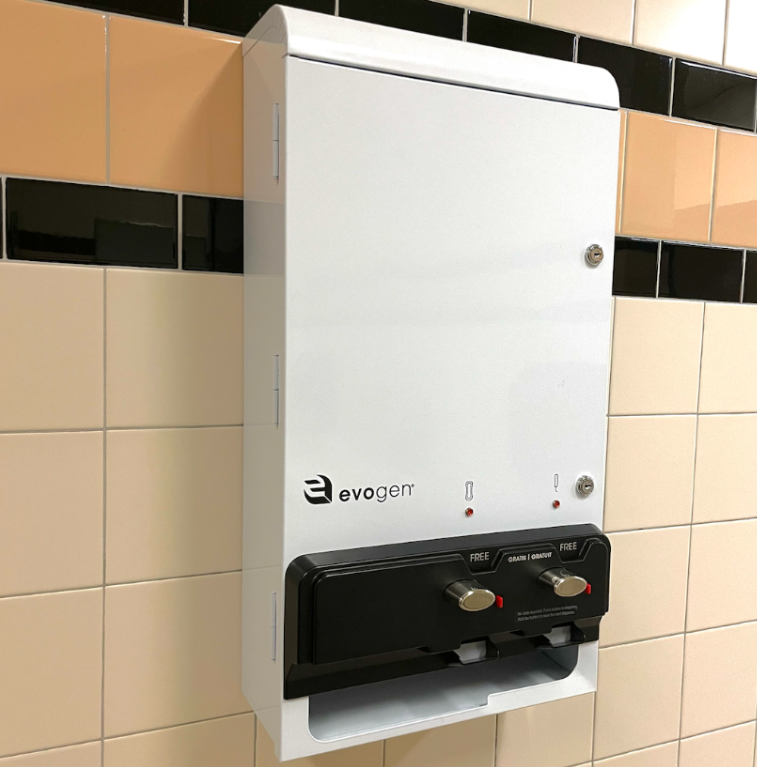In Praise of Free Period Products
Anyone who has frequented a public women’s restroom is familiar with the gray metal boxes that adorn the walls, promising a pad or tampon for 25 cents. Personally, I’ve never tried to use one of the machines, nor have I ever seen one being used. I hardly ever have a quarter on hand and the machines are scarcely stocked in the first place. One usually has better luck asking around for what they need, than battling it out with one of these machines.
The presence of the almost entirely useless pad/tampon machine feels so fundamental to the existence of the women’s bathroom that their removal at the beginning of this school year shocked me. The gray metal boxes I’d come to know so well had been replaced with sleek white cases complete with a light to warn when the stock was low, and a surface void of any place to insert a coin. Naturally, I had to try it.
On my first attempt, I pushed the oval button again and again to no avail. Like so many of its predecessors, this machine was not stocked either. I promptly dismissed the new machines as another fruitless gesture at menstrual equity. However, my cynical assumption was soon proven wrong. After a few weeks into the new school year— and probably with the help of some divine intervention— the machine was full of free period products.
A few times throughout this semester I’ve used products from one of these machines, and they’ve allowed me to easily get on with my day. However, when I checked that same machine today, as I wrote this article, I found that it was empty once again. I couldn’t find one on campus that was stocked. Like many other students who use period products, I’ve learned not to rely on these machines for what I need. Alternatively, the small “self-care” station outside the nurse’s office always has pads and tampons, but of course, this requires a trip across campus at an inconvenient time, to say the least.
One Bothell student expressed their frustration about those who take advantage of free products, explaining that when baskets with tampons and pads were put in restrooms during their freshman year, some students flushed them down the toilet. “It’s really annoying when people take advantage of other people trying to do nice things,” they said.

It’s only realistic to acknowledge that every now and then, supply will run out because a student took more than they needed, or wasted the products away, flushing them down the toilet. Still, I don’t think this is reason enough to scrap the entire idea. I would also caution against assuming that everyone has access to period products outside of school. It’s possible that someone might just need to take a whole bunch of tampons sometimes.
School bathrooms provide free toilet paper, seat covers, and soap, yet there are many schools across the country where products are only available in the nurse’s office. Is it really so much to ask that students aren’t forced to walk across campus, consumed by self-consciousness in order to get what they need to get through the day? Worse still, some schools don’t offer any free products. According to the 2021 “State of the Period” study, funded by the Thinx company and Period: The Menstrual Movement, 59% of students “rarely or never” have access to free products in school bathrooms. This may not be an issue for students of higher socioeconomic status, but for students in poverty, paying for period products may not be possible. “State of the Period” found that 23% of students “have struggled to afford period products”.
Often referred to as “period poverty”, the problem is exacerbated by the stigma that surrounds menstruation. Centuries of excluding or controlling AFAB (assigned female at birth) bodies have left us with a patriarchal misunderstanding of menstruation that is coated in shame. We don’t have to perpetuate that.
Beyond the obvious practical benefits, making pads and tampons available also sends a vital message. It tells students that having a period isn’t something that has to stay hidden and unacknowledged. It says, “you are deserving of having your needs met”. Having a period is not a choice that anyone makes, yet in many circumstances, period products are treated like luxury items. The new machines are a small step towards changing the way we treat period products, even if they’re seldom stocked.







